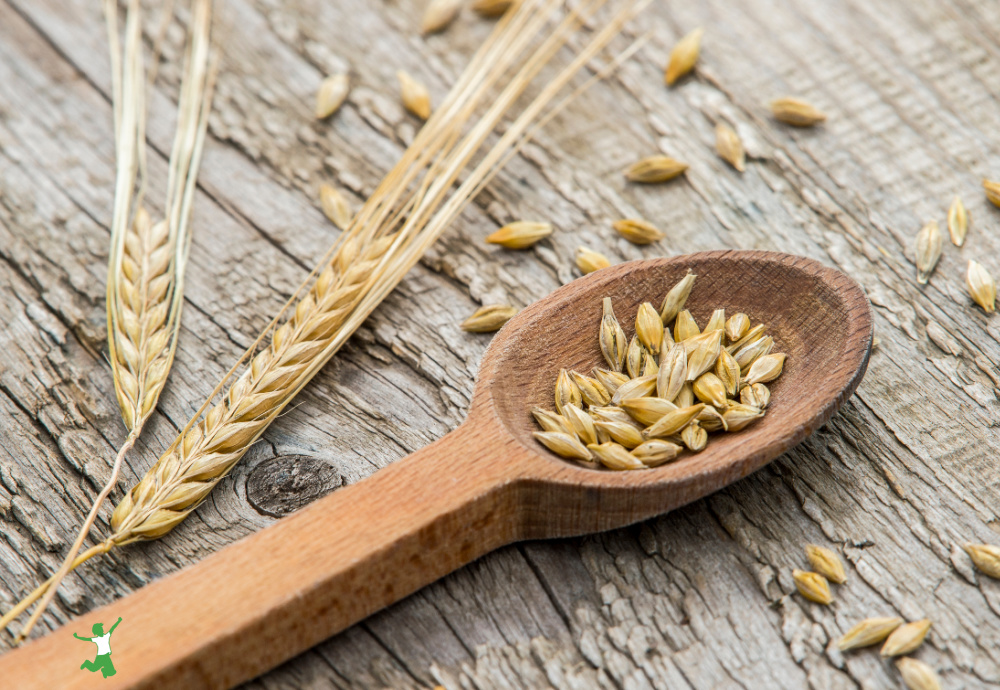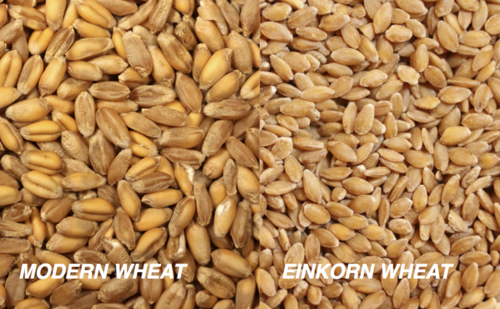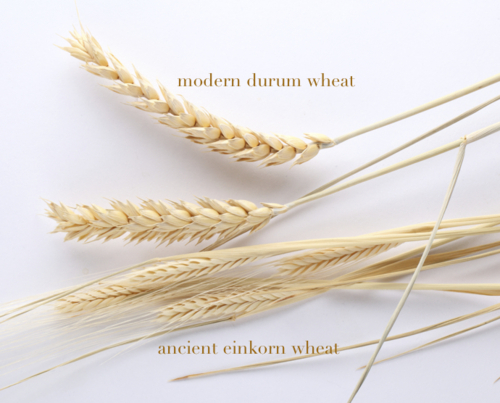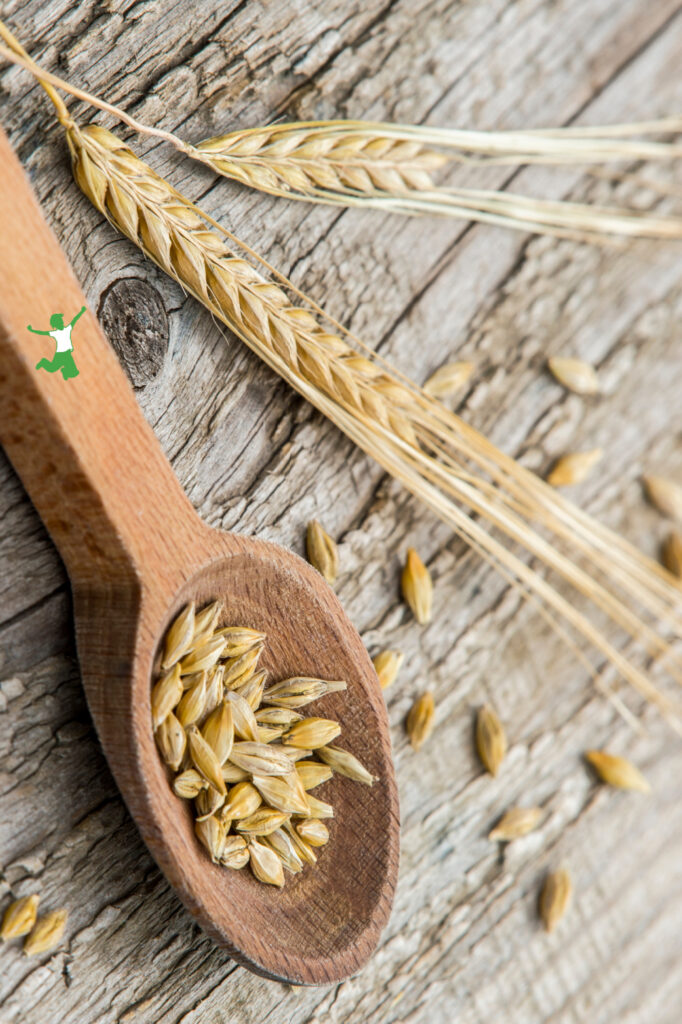There are four big reasons why einkorn is, by far, the best form of wheat to eat even when compared to other ancient grains like spelt, emmer, and kamut.

Most people who love to bake bread, pastries, and other goodies do not realize that einkorn is the best type of wheat to use.
Twenty-five or so years ago, I used to purchase organic white wheat (hard and soft) and spelt in bulk from a local grain co-op for my baking endeavors.
Grinding grain into fresh flour is certainly the most nutritious and tastiest way to bake! I also did this to avoid the conventional toxic wheat desiccated with gut-destroying glyphosate.
Caveat: Baking with freshly ground flour is only better if the bread is traditionally prepared.
Otherwise, the antinutrients like phytic acid are not broken down and harm to gut health is likely over time.
There certainly is a huge difference between modern processed wheat (hybridized by irradiation) and the organic, ancient grains you grind yourself at home.
I remember when I was breastfeeding my youngest child, if I ate so much as a mouthful or two of processed wheat at a restaurant, she would spit up for one or sometimes even two days!
If I ate organic wheat that I ground myself and either sprouted, soaked, or sour-leavened (sourdough), however, she never had any spit-up issues.
To me, this was a huge testament to the radically improved digestibility of wheat that is prepared using the wise methods of ancestral cultures.
Beware of persuasive influencers who claim that all you need to do is grind freshly ground flour and bake bread with baker’s yeast with no proper preparation such as soaking, sprouting or sour-leaving the dough necessary.
This approach is not how traditional societies ever baked their bread, and it is a recipe for serious gut issues!
Most people do not know that baker’s yeast is actually a modern invention only used in the past few centuries!
It quickly gained traction because it made baking faster and easier (NOT healthier). This is the case even when using freshly ground flour!
These quick rise breads using baker’s yeast gradually displaced traditional sourdough to the detriment of those who embraced this early “modern” cooking convenience.
Einkorn Benefits over Modern Wheat
With traditional baking the way to go (using a sourdough starter and NOT baker’s yeast), let’s talk about einkorn as the best type of wheat to bake with.
There are four reasons why I prefer to bake with einkorn wheat and no other type of ancient grains.
This isn’t to say I never use anything else, but if given the choice, I prefer to use einkorn.
Note that einkorn is not to be confused with farro or heirloom wheat.
Better Taste
My first experience baking with einkorn occurred after I received a thoughtful gift of, among other things, einkorn flour and wheat berries. I was delighted when I ground the einkorn into flour and saw how light and white it was.
I am not a fan of bran and am not of the food philosophy that all that fiber is actually good for your gut.
Fiber is a band-aid that covers up the root causes of constipation, a very common symptom of gut imbalance.
I recommend the book Fiber Menance as a good read on the subject.
The truth is that the unhybridized form of wheat…einkorn is the only one…does not have that much bran!
I was thrilled to see that my family thoroughly enjoyed the soaked waffles made with freshly ground einkorn flour.
Later on, I learned to make sprouted einkorn waffles that were more convenient but still highly digestible.
From that point, I gradually incorporated using einkorn for all my baking needs including this very popular no knead sourdough bread recipe.
Most Digestible
Because einkorn is unhybridized and low in bran, it is the most digestible form of wheat you can eat.
While my properly prepared grain dishes made with white wheat or spelt digest fine for our family, you can tell that the same dishes make with einkorn feel even better in the stomach.
This is possibly because einkorn contains good gluten, different on a molecular level from modern gluten in all other forms of wheat including ancient grains like spelt.
Better digestion means better absorption of nutrients, so einkorn surpasses the competition in that category as well.
Visually Distinctive

The first thing I noticed when I ground einkorn into flour for the first time was how much smaller a grain of einkorn is compared with a grain of modern wheat. They are about half the size!
In addition, I noticed that my grain grinder makes less noise when grinding einkorn berries into fresh flour because of softer, low bran kernels.
The distinctive crease on one side of a grain of modern wheat is also absent from kernels of einkorn.
The reason for the differences is that over the centuries, the genetics of wheat gradually changed due to human cultivation practices.
Year after year, farmers selected the seeds at harvest time that suited the goal of higher yields and MORE gluten.
This worked best for big farms and larger-scale agriculture, production, and distribution of wheat products.
The ONLY Unhybridized Wheat

Einkorn is like most plants in that it is diploid.
This means that einkorn contains only 2 sets of chromosomes.
About 2,000 years after einkorn wheat, nature created emmer via the natural hybridization of 2 wild grasses.
Consequently, emmer has 4 sets of chromosomes. Kamut and durum (bulgur) wheat are both descendants of emmer.
Spelt, an heirloom wheat, is the result of hybridization between cultivated emmer and another wild grass. Thus, spelt contains six sets of chromosomes.
Modern wheat is a descendant of spelt.
As you can see, einkorn is the purest and most ancient form of wheat available. With only 2 sets of chromosomes, a very different composition of gluten, and low bran, it is the most digestible form of wheat for baking at home.
Where to Source Quality Einkorn
The only downside of einkorn is that it is not widely available and tends to be more expensive than other types of wheat. It is still quite new to the North American market.
If you are sourcing organic einkorn berries, I recommend this quality brand.
If you need organic sprouted einkorn berries for more convenient baking, this farm based in the United States is my preferred source.
Have you tried einkorn wheat yet? If so, what observations have you made about this ancient, unhybridized wheat?









Have you tried to make sourdough with this? How does it compare to rye? Also, can we grow our own einkorn?
Yes, here’s a sourdough recipe using einkorn. https://www.thehealthyhomeeconomist.com/no-knead-einkorn-sourdough-bread/
Hi Sarah, my little ones are on gaps now and i am breastfeeding and hope to do intro when done. My husband eats store bread and ive been avoiding it out of fear and it makes me break out in acne. Do you soak the berries first, then grind? Or does “souring” replace the soaking step? Thank you for your time.
Souring replaces the soaking step.
Sarah,
I used to make a lot of my own bread. Six years ago I was diagnosed with Ankylosing Spondylitis. It is a type of arthritis. It is inflammation of the joints. I have avoided biological drugs, but my NSAIDS were not working and I put myself on the AIP diet. It has helped a lot, but, but I still have some pain. I’ve been on it 1 month, and will try and continue a couple more. When I begin to add one item at a time I want to try Einkorn wheat. Have you had people with autoimmune issues doing ok on it? Also, what about oats? What about Organic Valley pasture raised milk?
Thanks,
Holly Cory
I have non celiac gluten sensitivity. I tried Einkorn and I don’t have any problems eating it. It’s amazing and tastes great. I am an avid baker and absolutely love breads and cinnamon rolls made with it.
Has there been any clinical testing of the glycemic index/load of the ancient wheats?
Thank you for this information, I have been depriving myself from eating bread due to all the scary information of Franken-wheat. However, I’ve been truly wanting to make my own healthy alternative but my schedule doesn’t allow for me to tinker and figure it out! I am so grateful that you took all the guesswork (and tears) have provided all this information down to which brand is best! Will be purchasing it and start this new year with nourishing homemade bread 🙂
Hi Sarah! My husband was diagnosed 26 years ago with Celiac disease and I have longed to make him a healthy sourdough bread. I have been racking my brains ( and internet recipes) for a gluten free sourdough not only for a safe alternative but a HEALTHY alternative ( and tastes too) Have you heard of reported “celiacs” tolerating einkorn sourdough? I am wondering if any research has been done on this. I am digging as deep into this as I can and thought you might have read something on the subject
Hi Kim, this is all the research I know of on the subject. https://www.thehealthyhomeeconomist.com/can-celiacs-eat-true-sourdough-bread/
Hi Sarah, we can only source Emmer flour here in Australia. I’d love to make this bread but do you think it will work with the Emmer flour instead of Einkorn?
Emmer is a hybridized wheat and behaves differently in baking than einkorn.
Where is the best place to buy the Einkorn wheat and flour? My naturopathic doctor told me today to purchase my imported wheat and flour because most of the wheat grown in the US is not good and many gluten intolerant people can eat European bread but not US bread!
I buy from and recommend Jovial Foods. https://www.thehealthyhomeeconomist.com/go/jovial-foods/
We made the switch from modern wheat to heritage about 7 years ago when no doctors, including the Mayo Clinic, could figure out why he had to sleep,sitting up for a year due to severe acid reflux and sinus problems. We tried spelt, emmer and einkorn, the three usually promoted when researching heritage/ancient wheat. We then tried Turkey Red and Red Fife and found them to be superior in both flavor and baking properties. We now have added White Sonora for our soft wheat and are amazed by the way it bakes and testes. It works well in bread when added at about 20-30%.